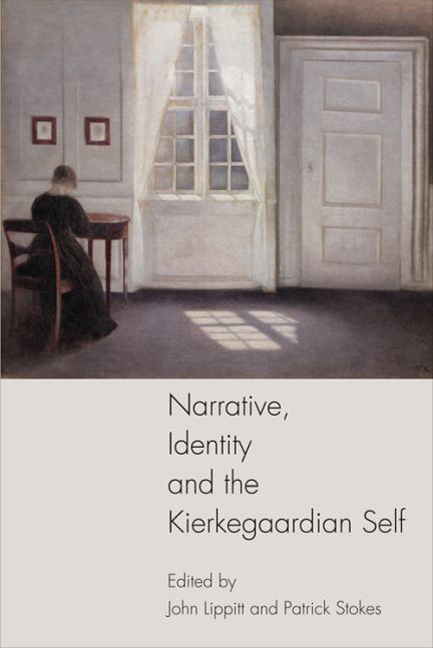Book contents
- Frontmatter
- Contents
- Acknowledgements
- Abbreviations
- Contributors
- Introduction
- 1 The Moments of a Life: On Some Similarities between Life and Literature
- 2 Teleology, Narrative and Death
- 3 Kierkegaard's Platonic Teleology
- 4 Narrative Holism and the Moment
- 5 Kierkegaard's Erotic Reduction and the Problem of Founding the Self
- 6 Narrativity and Normativity
- 7 The End in the Beginning: Eschatology in Kierkegaard's Literary Criticism
- 8 Forgiveness and the Rat Man: Kierkegaard, ‘Narrative Unity’ and ‘Wholeheartedness’ Revisited
- 9 The Virtues of Ambivalence: Wholeheartedness as Existential Telos and the Unwillable Completion of Narravives
- 10 Non-Narrative Protestant Goods: Protestant Ethics and Kierkegaardian Selfhood
- 11 Narrativity, Aspect and Selfhood
- 12 The Senses of an Ending
- 13 The End? Kierkegaard's Death and its Implications for Telling his Story
- Bibliography
- Index
Introduction
Published online by Cambridge University Press: 15 September 2017
- Frontmatter
- Contents
- Acknowledgements
- Abbreviations
- Contributors
- Introduction
- 1 The Moments of a Life: On Some Similarities between Life and Literature
- 2 Teleology, Narrative and Death
- 3 Kierkegaard's Platonic Teleology
- 4 Narrative Holism and the Moment
- 5 Kierkegaard's Erotic Reduction and the Problem of Founding the Self
- 6 Narrativity and Normativity
- 7 The End in the Beginning: Eschatology in Kierkegaard's Literary Criticism
- 8 Forgiveness and the Rat Man: Kierkegaard, ‘Narrative Unity’ and ‘Wholeheartedness’ Revisited
- 9 The Virtues of Ambivalence: Wholeheartedness as Existential Telos and the Unwillable Completion of Narravives
- 10 Non-Narrative Protestant Goods: Protestant Ethics and Kierkegaardian Selfhood
- 11 Narrativity, Aspect and Selfhood
- 12 The Senses of an Ending
- 13 The End? Kierkegaard's Death and its Implications for Telling his Story
- Bibliography
- Index
Summary
Questions of self-constitution and personal identity have been amongst the most heavily contested topics in Anglophone philosophy over the last half-century. Yet the pedigree of this discussion goes back considerably further. Such questions are clearly at work as early as the second-century theologians Athenagoras and Irenaeus, who worried about how identity could be preserved in bodily resurrection, and this eschatological dimension to the question was still very much alive in early modern discussions of mind and identity. Even Locke's treatment of personal identity in his Essay Concerning Human Understanding – which has conditioned the entire discussion to the present day – is primarily directed at questions of what we'll answer for on the Day of Judgement. Aristotle said philosophy begins with wonder, but the philosophy of personal identity partly begins with fear and hope: fear about what will happen to us after we die, hope that death might not be the end.
By the middle of the last century, when the Lockean problem of personal identity re-emerged in the philosophical literature, this existential basis for the discussion of identity had been largely set aside. Instead, philosophers such as H.P. Grice, David Wiggins, David Lewis and Derek Parfit came at the problem from a purely metaphysical perspective. The question became one of reidentification: what, they asked, are the persistence conditions across time of these rather odd entities we call ‘selves’ or ‘persons’? Are they physical, or, as Locke was read as claiming, constituted out of psychological factors – and if so, which ones? What forms of connection or continuity between psychological states across time would be sufficient to secure numerical identity? If the self is, instead, something physical, what needs to persist in order for selves to persist: an entire human animal? Whole bodies? Brains? Parts of brains?
This literature is vast, and, by the normally rather dry standards of analytic philosophy, sometimes quite thrilling, offering thought experiments involving body swaps, human fission, teleportation, infinite longevity and transmitting psychology from organic brains into computers. These discussions aren't entirely devoid of practical consequences; Parfit (1984: 281) for instance, insisted that a reductionist view of identity would make us more altruistic and less fearful of death.
- Type
- Chapter
- Information
- Narrative, Identity and the Kierkegaardian Self , pp. 1 - 10Publisher: Edinburgh University PressPrint publication year: 2015



